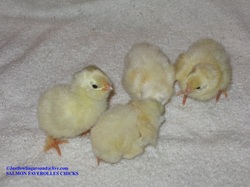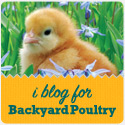
Chicken Coop Chatter©
One of the very first things to consider when wanting to start raising chickens, is how much room do you have to devote to a coop and run area, or do you intend to have only a coop with free-range and no enclosed chicken run? Either way, you need to figure out the space you have, versus the space you need and what your limit is on the chickens you can accommodate. Do you have a backyard, or do you have a barnyard to work with.
If you have plenty of space and intend to free range only, you need to figure out if there's good forage material, or if you need to plant nutrient rich grains, and wildflowers; and do you have trees, shrubs and places the chickens can seek shelter during all seasons and all weather elements of heat, wet and cold weather, as well as protection from predator visits, that you must expect if you intend to free-range your flock. With a free range flock, you must be able to rotate the flock from one area to another. Chickens will decimate lawns and barnyards very quickly. If you do not rotate, you will not have forage for them to scratch in and will lose their food source. You may have to replant areas where chickens have been as you rotate, so that forage is always available. Will you need to fence a large field or pasture to keep chickens from wandering into surrounding farms or neighborhoods. In addition, you need to plan to feed your chickens in winter when they are not able to forage through snow or ice to get to their food source.
One of the considerations that many people do not think of is what is this going to cost and how much discretionary money they have for feed, equipment and building materials. The larger the coop, the more birds, the higher the costs. Can you recoup that investment with meat and eggs. It is recommended that you have no less than 2 chickens per family member for the eggs. If you want chickens for a meat source as well, you need to figure out how often you eat chicken and if one or more is required per meal to feed your family or guests, then times that by 12, to figure out how many you need in a given year. Do you intend to process the chicken meat yourself? If not, you need to count on that extra expense to have an outside source do the processing. This may or may not defeat the purpose of having an inexpensive meat source. Since you will not likely process all the meat birds at one time, you need to plan a rotation, so you have meat birds coming up as others are being processed so you have a ready source of meat as needed. Do you intend to hatch those meat birds or buy chicks? If you're buying chicks, this again may defeat your purpose to raise inexpensive meat for your family. If you hatch yourself, then you can either buy hatching eggs, or collect your own fertile eggs, providing you have a rooster in your flock. Another expense is the coop and a run if you intend to have one; do you have the skills to do your own building or will you have to hire someone to do this building for you or will you need to purchase ready made.
Your next consideration is how many birds do you intend to start with. Your coop needs to be large enough to accommodate the numbers without crowding.. If you intend to have a chicken run, that also has to be large enough to prevent overcrowding. It's wise to plan for expansion and having the space with which to do that. Does the area for your coop and run have trees for summer shade, if not you will have the expense of providing some other means of shelter, such as shade cloth or tarps to protect the birds from succumbing to the heat. Even the hardiest chicken breed will succumb to heat without proper shade, and hydration. Is the coop and run area protected from bitter winter winds? You need to know the direction of the sun and of the prevailing winds when you set up your coops, which may or may not be where you want to set it up. Do you have a convenient water source to make watering your birds as drudgery free as possible? If you have to carry water in buckets from the house in winter, you may set yourself up for failure, so a water source needs to be as convenient as possible and protected from winter freezing.
Do you intend to have only layers where there is no need for a rooster or roosters with your flock for protection, and fertilization of hatching eggs. If you free-range, you should plan to have roosters. Roosters have a duty to perform. They protect the hens with their life, sound an alarm when danger approaches and they locate food for their ladies,while they stand guard to make sure the ladies can eat in peace without disturbance from predators or other invaders. The roosters are also the leader of the flock and direct the flock to safety and to the perches at night.
Next you must consider what breeds you wish to raise. Are they for a food source, eggs only or both meat and eggs? Do you want breeds that will lay virtually year round or fancy breeds, do you want them for exhibition, 4H or FFA projects, or just for your own enjoyment. There are many breeds to choose from and each breed is considered, dual purpose for meat and eggs, primarily eggs, exhibition or fancy feathered. Some fit into all categories, but not all breeds are suitable for meat or year round egg laying, and not all are suitable for exhibition. Are you interested in large fowl or bantam varieties. Know what your intentions are before making these decisions.
If you intend to hatch your own eggs, you will need an incubator or at least a broody hen that will do the hatching for you. Incubators vary in cost and how many eggs they will hold. A broody hen is limited by her own size as to how many eggs she can attempt to hatch for you. Note, that not all hens will set or raise chicks; you will only know when a hen is mature enough and takes on the roll of broodiness. but be aware, most hens of any breed will never take that roll. We've raised chickens many years, and over the years, a variety of breeds, with only one hen taking the roll of a brood hen until this past year when we did have several in a variety of breeds decide to be broody, but there are no guarantees you will have a broody hen in your flock, regardless of breed. The only reliable breed for broodiness is a Silkie bantam and she can only accommodate a few full sized eggs at a time.
Once you've made these decisions, you also need to plan for a quarantine area, to tend to sick birds or birds you bring in at a later time. This area must be separate from the main flock. If you're hatching your own eggs or buying chicks, you will need a brooder, with heat until those chicks are large enough to go into the general flock. Do you have space for a brooder in a protected environment. Do you have space for a growing on area when the chicks no longer need heat, but are too small to fend for themselves in the general population with your larger chickens.
Probably the very most important thing is, do you have time to take care of the chickens, feed, water, collect eggs, monitor for health and behavior? It's fine to think of how convenient having your own eggs or meat will be, but if you do not have the time to take care of your flock, it defeats the purpose. Do you have the extra time in the winter months that it will take to make certain the flock has plenty of water and feed, several times a day, if that water freezes? Do you have the extra time, several times a day in the summer to make certain the flock does not succumb to heat stress?
Are you prepared to deal with illness, disease and injuries in your flock? Things do happen and need to be dealt with immediately or you risk losing your entire flock and there are very few vets available that will treat fowl and costs may be prohibitive even if you are able to locate a vet willing to treat the birds. Are you prepared for predators that can wipe out your entire flock in one night of marauding? Are you prepared for instant or freak storms that can happen at any given time, where you may need to evacuate or at best be sequestered indoors. Are you prepared to forego vacations or weekends away? Not everyone is fortunate enough to have someone else available to take care of their flock while they are away.
Chickens have an average life span of 12 years. However their productive years average 3 to 4 years. Do you have room to provide a long term care center for the aging chickens that have become your pets? If you're in an area with limits on the number of chickens you're able to have, you need to take into consideration you will not be able to bring in more chickens until those aging ones have passed.
You will need to figure out the equipment you need to accommodate the number of chickens you have. You need to find a reliable feed store that can help you choose the proper medical needs, proper equipment and direct you to the best feed for your needs.
We do not intend to discourage anyone from raising chickens. We fully encourage it, however, too many new chicken enthusiasts have not done their research and see only a romantic ,nostalgic vision of raising chickens and soon find out, that it costs more than anticipated, or find they do not have time to take care of them certain times of the year, or have not planned ahead and end up with too many chickens for the allotted space they have available. Do your research, ask yourself all of the above questions, and make notes along the way. If your answers are yes to all of the questions, and you've figured out your costs for what you have planned then we encourage you to pursue your endeavors. If you answer No to even a portion of these questions, think very hard whether raising chickens is really your forte`.
Planning ahead, doing your research and knowing what your intentions are for raising chickens, will save you time, money and effort in the long run. You will have a lifetime of enjoyment with your chickens, you will have a good, nutritional food source and you as well as your children will learn how to become self-sufficient through your efforts.
If you do decide you are ready to forge ahead, Just Fowling Around team will be here to help with information, good solid advice and encouragement along the way. We can also provide you with hatching eggs across the country, or chicks and laying hens and hatching service if you are local or within driving distance of our farm. We wish you great success and always invite you to ask questions to assist you with your endeavors.
Chicken Coop Chatter© All Rights Reserved 2011-2016
 RSS Feed
RSS Feed





